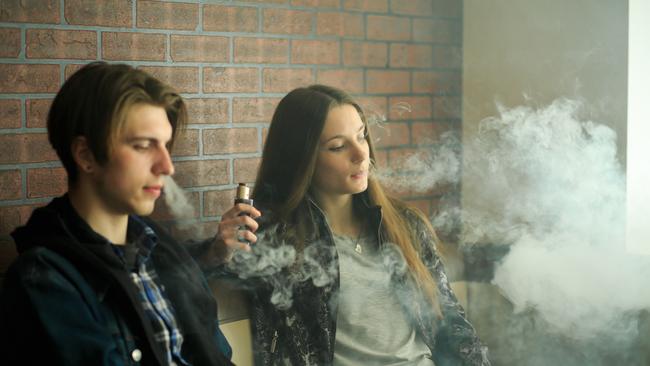Vaping out of control in schools, warn principals
“When you confiscate them, some kids act angrily.” A ban on the sale of vapes to children has failed to stop them bringing the devices to school.

School principals are calling for an immediate crackdown on vape sales in shops and online, as the Coalition refuses to back the Albanese government’s plan to confine sales to pharmacies.
At least one in three Australian teenagers has tried vaping, the Cancer Council revealed on Friday when it released a survey showing 93 per cent of parents want vapes banned without a valid prescription.
Australian Secondary Principals Association president Andy Mison called on both sides of politics to back a ban on vape sales.
He said teenage students had sworn at him and threatened to bash him when he confiscated their vapes.
“They’re fixated on getting their next hit, are very disruptive and distracted from learning,’’ he said. “We see the behavioural effects of withdrawal, as kids disappear from the classroom so they can get nicotine hits.
“When you confiscate them, some kids act angrily. I’ve been sworn at, I’ve been threatened with bashings.’’
Mr Mison said manufacturers were targeting children with brightly coloured vapes made to look like highlighter pens.
“The vapes are bright and colourful and clearly designed to attract kids,’’ he said. “They have sweet combinations of flavours like mango and pineapple, and they’re so addictive.
“Kids will be more likely to be using vapes much more frequently than they might have smoked cigarettes.’’
A Senate inquiry into classroom disruption this week identified “strong links between vaping, nicotine withdrawal and classroom disruption’’.
The NSW Primary Principals Association told the inquiry of “increasing evidence of vaping being a problem in primary schools’’. “Vaping should be urgently addressed as a health problem, not a school discipline problem to solve,’’ it said.
Cancer Council chief executive Tanya Buchanan said vapes often contained nicotine and carcinogens such as formaldehyde and metals, which are not declared on the label.
Professor Buchanan said nicotine harms children’s developing brains, affecting the part of the brain that controls attention, learning, moods and impulse control.
“Retailers are still knowingly selling nicotine-containing vapes in local shops near schools, with enticing displays of lollies lining the entrance, attracting the attention of young people,’’ she said.
“Without the Parliament’s support for the federal government’s upcoming reforms, purchasing e-cigarettes will remain alarmingly common and easy for young people.’’
Retailers are banned from selling vapes to children, but enforcement is lax.

The Albanese government banned the importation of single-use vapes on January 1, but retailers are allowed to sell any vapes they have in stock to adults.
The government plans to introduce legislation this month to limit the sale of vapes to pharmacies, with a prescription, for use by smokers trying to quit.
Federal Health Minister Mark Butler called on the opposition to back Australia’s “world-leading vaping reforms’’.
“Once the legislation passes the parliament later this year the only legal way to buy vapes will be therapeutically, through a pharmacy,’’ he said.
The federal opposition refused to commit to the reform, with Nationals leader David Littleproud insisting that retailers be allowed to sell vapes to adults without a prescription.
Mr Littleproud – whose party has received donations from tobacco companies – refused to say if he would support the ban on vape sales in shops.
“We need to protect children from vaping and crack down on the uncontrolled black market,’’ he said.
“The Nationals support a process to develop a comprehensive regulatory framework for e-cigarettes to keep them out of the hands of children.
“We believe that regulating e-cigarettes is also crucial to weakening the illicit black market.’’
The federal Opposition’s education spokeswoman, Liberal Senator Sarah Henderson, said that vaping in schools was “rampant and educators need every possible support to combat this scourge’’.
“With over a quarter of young people aged 14 to 17 admitting to having tried or regularly use vapes, Australian schools need tough action from this government to prevent vaping spiralling out of control,’’ she said.



